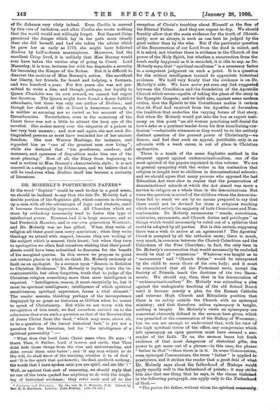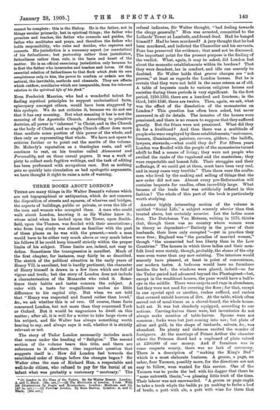Ir the word " Sophist" could be used to-day in
a good sense, we should be inclined to say that the late Dr. Moberly had a double portion of the Sophistic gift, which consists in dressing up a case with all the advantages of logic and rhetoric, until it becomes thoroughly impressive. All Churches which set store by orthodoxy necessarily tend to foster this type of intellectual power. Newman had it in large measure, and so had Frederick Maurice, and in our own generation Westcott ; and Dr. Moberly was no less gifted. When they write of religion all these good men carry conviction ; when they write theology we attend with respect, because they are writing of the subject which is nearest their heart ; but when they turn to apologetics we often find ourselves wishing that their proof- sheets could have been submitted to Socrates for the benefit of his marginal queries. In this review we propose to point out certain places in which we think Dr. Moberly seriously at fault as an apologist. In a sermon upon "Reason in Relation to Christian Evidences" Dr. Moberly is laying down the in- controvertible, but often forgotten, truth that to judge of the Christian religion something more than mere intelligence is required. " Intelligence, reason, it must essentially be, but it must be spiritual intelligence ; intelligence of which spiritual sensitiveness, spiritual experience, forms a vital element." The reader assents, thinking perhaps of the incompetence displayed by so great an historian as Gibbon when he comes to speak of Christianity. But while we are warm with the recognition of this truth, we find ourselves carried on to the admission that even such a question as that of the Resurrection of Jesus Christ from the dead, " which may seem, above all, to be a question of the barest historical fact," is yet not a question for the historian, but for " the intelligence of a spiritual personality "
"What does Our Lord Jesus Christ mean when He says : 'I thank Thee, 0 Father, Lord of heaven and earth, that Thou didst hide these things from the wise and understanding, and didst reveal them unto babes '; and If any man willeth to do His will, he shall know of the teaching, whether it be of God' ; and 'It is the spirit that quickeneth; the flesh profiteth nothing: the words that I have spoken unto you are spirit, and are life' ?" Well, as against that sort of reasoning, we should reply that no one of the texts quoted has anything to do with the weigh- ing of historical evidence ; they refer each and all to the * Problems and Principles. By the late B. C. Moberly. D.D. Edited by Bar. B. B. Bockhorn. London: John Murray. 1100. ed. net] :- frankly allow that the main evidence for the truth of Christi" anity, now as always, is such as can best be judged by the good rather than by the wise. But if the particular question of the Resurrection of our Lord from the dead is raised, and it is asked, not whether there is evidence in the Church of the power of the Holy Spirit, but whether a resurrection from the tomb really happened as it is recorded, it is idle to say, as Dr.
Moberly says, that " spiritual excellence " is a necessary factor in a competent judgment on such a point. It is a question for the critical intelligence trained to appreciate historical evidence. We hold very firmly that the evidence is on Dr. Moberly's side. We have never yet seen any link suggested.
between the Crucifixion and the foundation of the Apostolic Church which seems capable of taking the place of the story ira the Synoptic Gospels ; and we hold also, against some modem critics, that the Epistle to the Corinthians makes it certain that St. Paul had received from the Apostles at Jerusalem the tradition that underlies the varying forms of that story, But when Dr. Moberly would put into the box as expert testi- mony on this point "an old woman practising self-denial for love's sake or a penitent tender from his first humiliating con- fession "—admirable witnesses as they would be to the entirely distinct question of the present power of Christianity—we demur, and feel that such an appeal, justifiable only in an advocate with a weak cause, is out of place in Christian} apologetics.
There is a touch of the same Sophistic method in the eloquent appeal against undenominationalism, one of the most spirited of the papers reprinted in this volume. We are in general sympathy with the writer in his contention that religion is taught best to children in denominational schools ; and we should agree that many persons who opposed the last Education Act were slow to realise that the preservation of denominational schools at which the Act aimed was more a service to religion as a whole than to the denominations. But when the question is raised of the children whom the denomina- tions fail to reach we are by no means prepared to say that there could not be devised for them a religious teaching which would satisfy the majority of both Churchmen and Non- conformists. Dr. Moberly enumerates " creeds, catechisms, ministries, sacraments, and Church duties and privileges " as things which would necessarily be ruled out of a syllabus that could be adopted by all parties. But is this certain, supposing there was a wish to arrive at an agreement ? The Apoatlea' Creed is accepted by all the orthodox sects ; there is much, very much, in common between the Church Catechism and the Catechism of the Free Churches ; in fact, the only item in Dr. Moberly's enumeration that would necessarily be excluded would be that of " ministries." Whatever wastaught as to " sacraments" and " Church duties " would be interpreted by the child to mean those of his own body; and it mush be remembered that all the Protestant sects, except the Society of Friends, teach the doctrine of the two Sacra. ments. We should say, then, that in his denunciation of " undenominationalism" Dr. Moberly was extending a plea against the undogmatic teaching of the old School Board, until it became merely a plea for the Roman Catholic and extreme High Church and Ritualistic position that there is no safety outside the Church with an episcopal ministry; and that therefore, unless episcopacy is taught, nothing is taught. Dr. Moberly's views on episcopacy are somewhat obscurely defined in the sermon here given, which was preached at the consecration of the Bishop of Worcester; but we can see enough to understand that, with his view of the high spiritual virtue of the office, any compromise which left episcopacy an open question must have seemed a sup. render of the faith. To us, the sermon bears but fresh evidence of that most dangerous of rhetorical gifts, the power to get more out of a phrase—in this case, the phrase " father in God "—than there is in it. In some Communions, even episcopal Communions, the term " father " is applied to presbyters, and it strikes the reader that a good deal of what Dr. Moberly says about the fatherhood of Bishops wool( apply equally well to the fatherhood of priests ; it may Alike him also that one thing that he says, in the clause italicised in the following paragraph, can apply only to the Fatherhood of God
"The pastor, the father, without whom the spiritual community.
cannot be complete : this is the Bishop. He is the father, not in things secular primarily, but in spiritual things; the father who preaches and teaches, the father who counsels and guides, the father who meditates and prays, and therefore the father who holds responsibility, who rules and decides, who reproves and corrects. His jurisdiction is a necessary aspect (or correlative) of his fatherliness ; but pastorship rather than jurisdiction, fatherliness rather than rule, is the basis and heart of the matter. He is an official exercising jurisdiction only because he is first the father who intercedes and teaches and loves. Of this essential relation of fatherliness to that flock which finds its own completeness only in him, the power to confirm or ordain are the natural, the inevitable, methods and channels. They are effects which outflow, corollaries which are inseparable, from his inherent relation to the spiritual life of his flock."
Even Frederick Maurice, who had a wonderful talent for finding mystical principles to support ecclesiastical facts, episcopacy amongst others, would have been staggered by this apologia. We do not criticise it, because we do not see that it has any meaning. But what meaning it has is not the meaning of the Apostolic Church. According to primitive doctrine, all power is " inherent " in Christ, and in the Church as the body of Christ, and no single Church officer does more than mediate some portion of this power of the whole, and then only as representing that whole. We have not space to criticise further or to point out the merits of the volume. Dr. Moberly's reputation as a theologian rests, and will continue to rest, on his treatise called Atonement and Personality, not on these casual papers. It was a work of piety to collect such fugitive writings, and the task of editing has been performed with scrupulous care. But as nothing gets so quickly into circulation as bad apologetic arguments, we have thought it right to raise a note of warning.























































 Previous page
Previous page